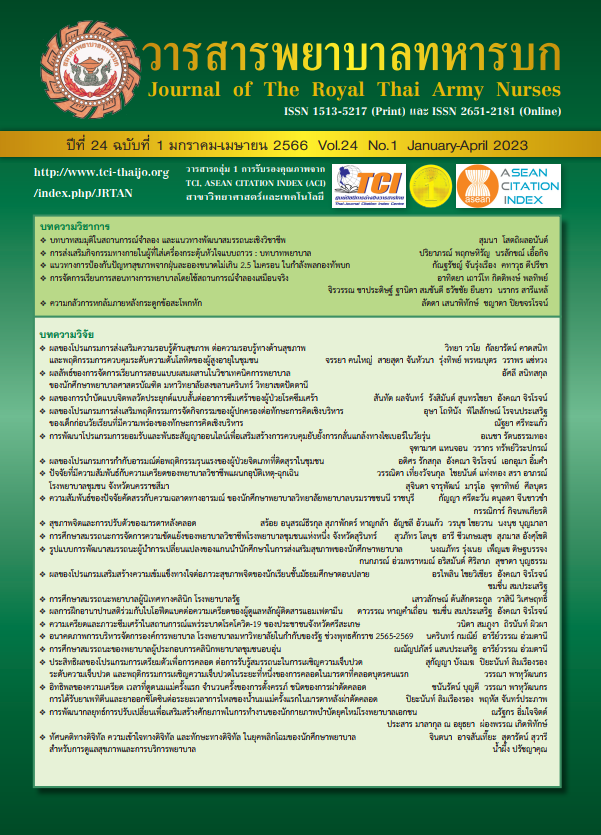Life Experiences of Cholangiocarcinoma Patients and Their families
Keywords:
Cholangiocarcinoma patient, Coping behaviors, Life experience, Cancer’s familiesAbstract
This qualitative study in hermeneutic phenomenology was aimed to investigate described meanings and coping experiences of Cholangiocacinoma patients and their families. Data collecting by purposive sampling of 9 key-participants who were patients diagnosed with cholangiocarcinoma and their families were conducted. Data were collected by in-depth-interview and analyzed using Colaizzi’s technique focusing on interpretation of individual’s experience.
The result showed that(1) ‘Liver mass’ was the given meaning of cholangiocarcinoma by patients and their families while ‘malignant tumor’ is the meaning of severity. (2) FACT was patients’ coping mechanism. At the beginning, they were fearful or ‘soul losses’, and anxiety but after treatment, they were relieved and accepted their fates. Then, they had adapted and changed their behaviors. Finally, they can teach others. (3) Both modern medicine provided by health professionals, and alternative medicine provided by Thai traditional sectors were their healing choices. (4) Mental support from their families, relatives and community had impact on patients’ healing, especially their minds. Giving the meaning for cancer, learning for adaptation can reflect the treatment and healing plans for health professionals that are relevant to patients and families’ perspectives and perceptions as well as suitable for health cultural context in each community.
Downloads
References
Imsamran W, Chaiwerawatthana A, Thanasitthichai S, Loawahutanont P, Seangkrajang S, Suphaatthakorn P, et al. Cancer cited in Thailand Medical Services Profile 2011-2014 1sted. Nonthaburi: Department of Medical service. 2014. (in Thai)
Phoncharoen R, Banchob Sripa B., Bundhamcharoen K. The Burden of Cholangiocarcinoma Attributable to Liver Fluke Infection in Thailand. Journal of Health Systems Research. 2018; 12 (3): 490-9. (in Thai)
National Cancer Institute. Hospital-based cancer registry 2019. Bangkok: Newthammada Publishing. 2020. (in Thai)
Division of Communicable Diseases. The incidence of Cholangiocarcinoma and Liver fluke infection at Nan province. Nonthaburi: Division of Comunicable Diseases. 2020. (in Thai)
McGee R.F. Overview: Psychosocial aspects of cancer. In Groeneald,S.L., et al. Cancer nursing principle and practice. 3rded. Boston: Jones and Bartlett publishers. 1993.
Janthavanich S. Data Analysis in Qualitative research. Bangkok: Chulalongkorn University publiching. 2016. (in Thai)
Lazarus R, Folkman S. Stress, Appraisal and Coping. New York: Springer. 1984.
Khumkom S. Coping experience of patients with breast cancer. Thai Red Cross Nursing Journal.2019; 12(1): 161-76. (in Thai)
Nak-ai W, Jiawiwatkul U, Temsirikulchai L, Nontapattamadul K. Community public policy process for solving cadmium contamination problems in the environment: A case study of Mae Sod District, Tak Province. Kasetsart Journal of Social Sciences. 2017; 39: 59-66.
Plodplueng A. Data analysis in Phenominalogy. Nursing Journal of the Ministry of Public Health. 2013; 23(2): 1-10. (in Thai)
Pamulila S, Sangchart B, Paprom W. The self-care experience of Cholongiocarcinoma patients and Familiies. Journal of Science and Technology UbonRatchathani University. 2019; 21(1): 146-54. (in Thai)
Kuha P. Factors related to alcohol drinking of female undergraduate university students, Chiang Mai province. [Independent Study/ Master Degree]. Chiang Mai: Graduate School Chiang Mai University. 2015. (in Thai)
Thasaneesuwan S, Nilmanat Th. Psychological Distress in Patient with Cancer Undergoing Chemotherapy and Nursing Care. Songklanakarin J. Nuuse. 2019; 39(4): 110-9. (in Thai)
Olson M. Healing the dying. Columbia: Delma Thomson Learning. 2001.
Pungrasamee T. Palliative care: Caring for pain relieave the way for relieve distress. Bangkok: Pimdee. 2001. (in Thai)
Kleinman, A. Patients and healers in the context of culture. London: University of California. 1989.
Kweansungnern M, Sankatiprapa K, Pipatpen M. Applying of Critical Autoethnography to Aesthetic of Self-Care by People with Epilepsy. Journal of The Royal Thai Army Nurses. 2020; 21(3): 294-305. (in Thai)
Bengtson V. L., Olander E. B., Haddad A. A. The “generation gap” and aging family members: Toward a conceptual model. In Gubrium J. F. (Ed.), Time, roles, and self in old age (pp. 237-263). New York, NY: Human Sciences Press. 1976.
Sutinyamanee V. Intergenerational family Solidarity among Hill Tribe People in Northen Thailand. [Disertation]. Bangkok: Chulalongkorn University. 2017. (in Thai)
Vudhironarit S., Pommala W., Satthathummarak A. Self-Care Experience of Bed-bound Elderly. Journal of The Royal Thai Army Nurses. 2020; 21(3): 252-61. (in Thai)
Saikaew S, Tanatwanit Y, Kunsongei W. Effective Communication between Nurses and Advanced Cancer Patients. Journal of The Royal Thai Army Nurses. 2020; 21(2): 93-101. (in Thai)
Downloads
Published
How to Cite
Issue
Section
License
Copyright (c) 2023 Journal of The Royal Thai Army Nurses

This work is licensed under a Creative Commons Attribution-NonCommercial-NoDerivatives 4.0 International License.
บทความหรือข้อคิดเห็นใดใดที่ปรากฏในวารสารพยาบาลทหารบกเป็นวรรณกรรมของผู้เขียน ซึ่งบรรณาธิการหรือสมาคมพยาบาลทหารบก ไม่จำเป็นต้องเห็นด้วย
บทความที่ได้รับการตีพิมพ์เป็นลิขสิทธิ์ของวารสารพยาบาลทหารบก
The ideas and opinions expressed in the Journal of The Royal Thai Army Nurses are those of the authors and not necessarily those
of the editor or Royal Thai Army Nurses Association.






